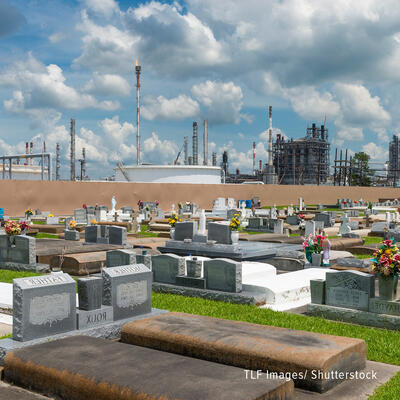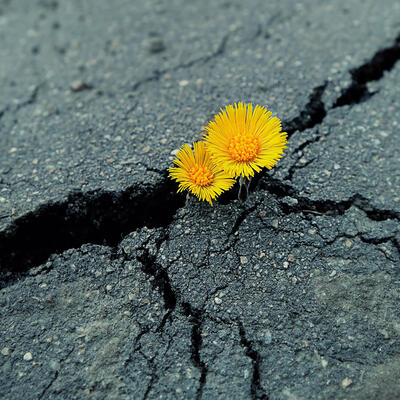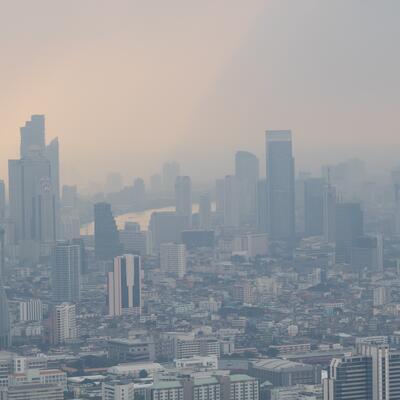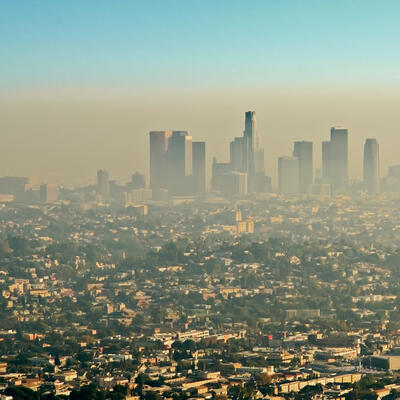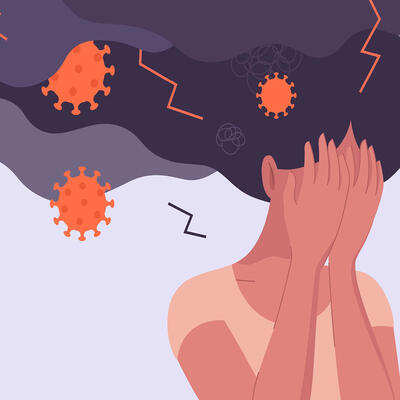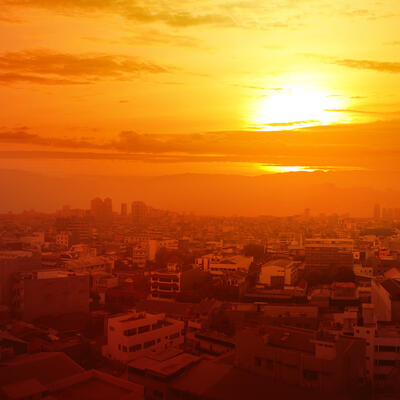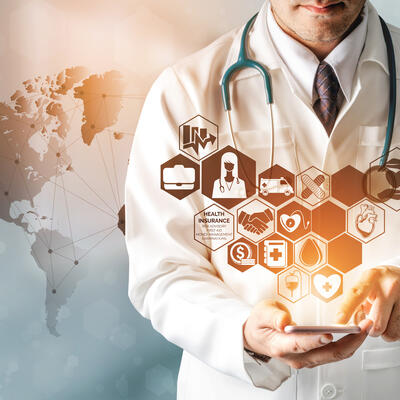
COVID-19 and Climate: Implications for Public Health
Guests
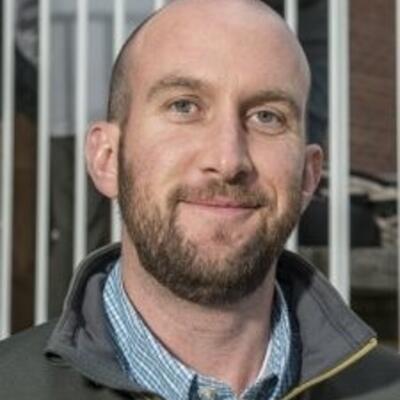
Brian Allan
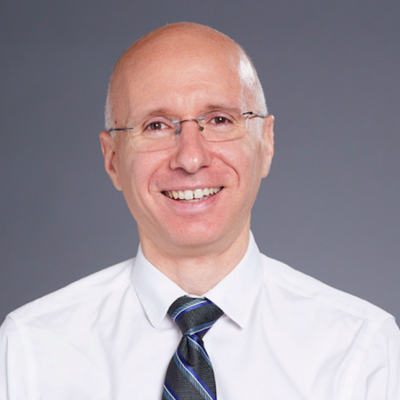
Aaron Bernstein
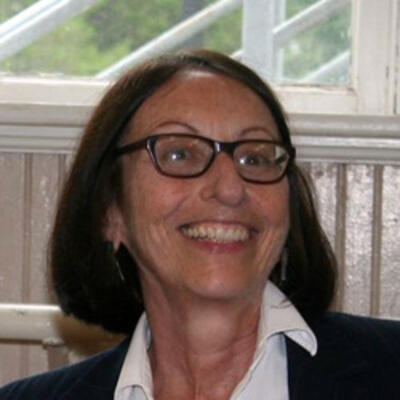
Barbara Gottlieb
Summary
Human incursion into remote ecosystems can have far-reaching effects on our health and well-being. Deforestation and changes in land use, often to produce food, disrupt delicate ecological and water systems. They also facilitate new and potentially dangerous interactions between people and other organisms.
“Those are the contacts between humans and animals that keep disease biologists up at night because those are the best opportunities for spillover events to occur,” explains Brian Allan, Associate Professor of Entomology at the University of Urbana-Champaign, where he studies the ecology of infectious diseases, particularly those transmitted by the bite of infected ticks and mosquitoes.
“You have diseases that are typically thought of as being travel associated or being associated with the tropics,” says Allan, “so I think we can expect the health system to be increasingly stressed by these types of climate-induced health problems along with everything else we’re grappling with during a pandemic like COVID-19.”
The novel coronavirus that jumped to humans from bats is highlighting how challenging it can be to manage infectious disease. The doctors and medical workers who treat COVID patients are also on the frontlines of climate health impacts.
“Health professionals are the ideal translators of scientific information,” says Barbara Gottlieb, Director of Environment and Health at Physicians for Social Responsibility, where she guides national work on climate energy and air quality.
“We're finding that treating COVID-19 is extremely difficult,” she notes, adding that “it’s gonna be more difficult or virtually impossible to treat climate change. You can't treat climate change.”
And yet in many respects, planning for pandemics and climate disruption overlap. Moreover, the kinds of conservation required to protect the biosphere would cost a fraction of the after-the-fact response to the coronavirus, and would come with immediate health dividends.
“What we need to do now is recognize we have a window of opportunity to really flatten the curve when it comes to climate change,” says Aaron Bernstein, Interim Director of The Center for Climate Health and the Global Environment at the Harvard School of Public Health and a pediatrician at Boston Children's Hospital.
“I just see the immense opportunity here to take actions that are both gonna provide for a healthier present, they’re gonna potentially buffer against pandemic risk, and of course they’re gonna give the future that we really want our children to have.”
Additional interview:
Jason Rohr, Professor at the University of Notre Dame
Harvard C-Change
Physicians for Social Responsibility
School of Integrative Biology, UIUC
Full Transcript
Greg Dalton: This is Climate One. [pause] What can the COVID pandemic teach us about climate and infectious disease?
Brian Allan: Some of the drivers of climate change are also drivers of infectious disease emergence.
Greg Dalton: The doctors and medical workers who treat COVID patients are also on the frontlines of climate health impacts.
Barbara Gottlieb: Health professionals are the ideal translators of scientific information. What does this mean for my family? How could this be affecting my health? And most of all, what can we do about it?
Greg Dalton: In some respects, planning for pandemics and climate disruption overlap.
Aaron Bernstein: I just see the immense opportunity here to take actions that are both gonna provide for a healthier present, they’re gonna potentially buffer against pandemic risk, and of course they’re gonna give the future that we really want our children to have.
Greg Dalton: COVID, Climate, and Public Health. Up next on Climate One.
---
Greg Dalton: What do climate change and the COVID pandemic have in common when it comes to public health? Climate One conversations feature oil companies and environmentalists, Republicans and Democrats, the exciting and the scary aspects of the climate challenge. I’m Greg Dalton.
Greg Dalton: Human incursion into remote ecosystems can have far-reaching effects on our health and well-being. Deforestation and changes in land use, often to produce food, disrupt delicate ecological and water systems. They also facilitate new and potentially dangerous interactions between people and other organisms.
Brian Allan: Those are the contacts between humans and animals that keep disease biologists up at night because those are the best opportunities for spillover events to occur.
Greg Dalton: Brian Allan is Associate Professor of Entomology at the University of Urbana-Champaign. He studies the ecology of infectious diseases, particularly those transmitted by the bite of infected ticks and mosquitoes. The novel coronavirus that jumped to humans from bats is highlighting how challenging it can be to manage infectious disease.
Barbara Gottlieb: We're finding that treating COVID-19 is extremely difficult. Well, it’s gonna be more difficult or virtually impossible to treat climate change. You can't treat climate change.
Greg Dalton: Barbara Gottlieb is Director of Environment and Health, at Physicians for Social Responsibility, where she guides national work on climate energy and air quality. She authored PSR's reports on the health implications of fossil fuels including, Too Dirty, Too Dangerous: Why Health Professionals Reject Natural Gas and, Coal's Assault on Human Health. Action to safeguard the climate has paled in comparison to the response to the coronavirus.
Aaron Bernstein: What we need to do now is recognize we have a window of opportunity to really flatten the curve when it comes to climate change.
Greg Dalton: Aaron Bernstein is Interim Director of The Center for Climate Health and the Global Environment at the Harvard School of Public Health. As a pediatrician at Boston Children's Hospital, he’s passionate about the health impacts of the climate crisis on children's health and advancing the well-being of children around the world. All three guests joined us from their homes to explore the implications of COVID and climate for public health – beginning with some fundamental truths now staring us in the face, as Aaron Bernstein explains.
Aaron Bernstein: I think what COVID is showing us is really that nature is trying to tell us something. Nature has given us a few shots over the bow here with emerging infections COVID is the most recent example. But we've got MERS, SARS, HIV pandemic influenza. These are all diseases that had come into people from animals. And if you look at these emerging diseases more probably the majority are wild animals. And so what ultimately is staring us in the face is the reality that we have taken advantage of nature to the point where we’re putting ourselves at risk. And on top of that, we know very clearly what we can do to make a difference to prevent things like COVID. And among the things that really matter are climate solutions and in fact, in many ways pandemic solutions are climate solutions. And now is the important time to be talking about this.
Greg Dalton: So be specific. What are some things that could reduce pandemic that could also reduce carbon pollution and climate change? What are some of those co-solutions?
Aaron Bernstein: Big one is deforestation. We think about tropical forest lost the sort of a moral crisis, you know, what a terrible loss to everyone and particularly to the species that are in tropical forest. But we know from many examples that the chopping down forests increased risks of the spillover pathogens from animals into people. We don't know that exactly with COVID but in other diseases that have come out of bats, Ebola, you may remember the most recent bat Ebola outbreak in West Africa. The evidence suggests that deforestation in West Africa actually may have pushed bats into parts of West Africa. They were in before and as you may know the most recent Ebola epidemic in West Africa was in a part of Africa that they happened before. And so you know, preventing deforestation is a climate solution preventing deforestation is also a solution to prevent disease emergence. Burning fossil fuel is another good example.
Greg Dalton: Burning fossil fuels is also a climate and a health thing?
Aaron Bernstein: Yeah, I mean, you know, we know air pollution is bad for everyone's health in all kinds of ways. In the evidence we have suggests that particularly with respiratory infections like COVID and we don't have direct evidence on COVID but in its first cousin which was SARS. People exposed to more pollution were twice as likely to die based upon the evidence that we have. And so we have evidence that air pollution not only can make people sicker but it may make people more likely get infected with these pathogens as well. So burning less fossil fuel which in China kills an estimated 1.6 million on an annual basis may be contributing to the spread of diseases like COVID there and elsewhere.
Greg Dalton: Brian Allan, how do you see the connections between the spread of disease, as Aaron just said, and the use of fossil fuels the COVID and climate connection.
Brian Allan: Yeah, well I completely agree with Aaron’s answer that some of the drivers of climate change are also drivers of infectious disease emergence. And so land use change is a big one in terms of altering native ecosystems in ways that is exacerbating climate change, as well as facilitating the emergence of novel infections in human population. In terms of solutions the problems are parallel and the signs that requires large collective action that has to cross political boundaries, cultural boundaries and result and effective response that can limit the further spillover of the infections that can cause pandemics in the future. And it will require similarly large-scale response to tackle the problem of climate change.
Greg Dalton: Barbara Gottlieb, you think it’s fair to say that if you ask an average American person about climate change. They would think about smokestacks maybe polar bears maybe tailpipes. They wouldn’t necessarily think about human lungs or personal health. Why is it and if we just heard there’s such a strong connection between climate and personal health, why don't more people think of it that way in that frame?
Barbara Gottlieb: Well, I think some people are still thinking about climate change as something that's either out there or in our future. Those images that we were given early on and they still stick. So you mentioned polar bears, I’m afraid polar bears might still be for a lot of people kind of the iconic image of climate change. But really what we’re finding is that more and more people are recognizing that climate change is real it’s happening now and it’s affecting their health. So polling shows us that and I think also people’s lived experience is telling the math. So if you live in California and you lived through the wildfires you know what the impact was on air quality on health. And in fact, some of the particulate matter that was generated from those fires flew all the way across the country and reached Baltimore. Every region of the country is having its own climate impacts. In the southwest it might be drought and heat, you know, the heat effects can be a severe heatstroke which can be fatal. The Midwest experience is extreme storms and floods with water contamination impact on agriculture. And so all the way across the country and all the way through people's lived experience, I think the tide has turned. I think people recognize climate change as a real problem. More and more people are recognizing it as essentially human caused. And they’re seeing and they’re feeling the health consequences. I certainly know that the doctors in my own organization are seeing more patients presenting with symptoms and diseases that they can link to climate change.
Greg Dalton: And we’ll get in to a little more later about sort of the medical profession and their engagement on climate change. Over the past few weeks we’ve seen increasing news coverage of how expanding our agricultural footprint can help lead to the spread of infectious diseases like COVID-19. So we should just cut back, right? Well, it may not be that simple according to an article published last year in the journal Nature Sustainability. We spoke to one of the article’s authors Professor Jason Rohr who told us population growth might make it hard to stop encroaching our wildlands and climate change makes the problem even more complex.
[Brief Pause]
Greg Dalton: That was Jason Rohr, Professor at the University of Notre Dame. A lot of really staggering points in there, particularly the idea that area land size as large as United States, Brian Allan, will be added into agricultural production, probably from rain forest tropical areas. That’s gonna bring humans in contact with species and disease. It sounds like more people more food, more land, more disease. What can be done about that, Brian Allan?
Brian Allan: And further compounding the issues that some of the land we’re currently using for agriculture may become less suitable for production as well under climate change. So not only will we need more land to see the growing human population but some of what is currently being used, may become vulnerable to climate shocks. It’s going to be an issue that it’s gonna intersect with infectious disease emergence because we've seen a pattern where development of natural areas typically for agricultural production but also for timber extraction harvesting of other natural resources creates inroads into those areas that facilitate human wildlife interaction. And so for example in central Africa logging creates roads that allows hunters’ access to areas that were previously been accessible. They hunt wildlife not only for subsistence consumption but also for a global wildlife trade. And those are the contacts between humans and animals that keep disease biologists up at night because those are the best opportunities for spillover events to occur. So you have humans hunting wildlife coming in direct contact with the animals butchering and consuming them. We think historically, this is the way many infectious diseases have entered into the human population. HIV like we got it start through human consumption and non-human primates. Historically Ebola outbreaks likely followed a similar pathway. So not only do you have this issue of loss of natural area to agriculture, but it also creates more opportunities for humans to come in contact with wildlife than they had before. Interventions will require regulation trying to enforce laws against wildlife consumption and wildlife hunting. But also culturally sensitive approaches that take into account that reasons people are hunting bush meat could be driven by lack of economic opportunity and lack of alternative sources of protein. And so try to address the actual problem that's leading to these behaviors in the first place.
Greg Dalton: Aaron Bernstein, one of the other points in that clip from Jason Rohr was the increased urbanization in the world. We know that the world is urbanizing very rapidly that's good for climate people who live in cities have lower carbon footprints than people who live in rural areas, drive longer distances takes more for services, etc. But increasing urbanization is also good for diseases who like to spread quickly in urban populations as we’re seeing with COVID-19. So is there a clash between urbanization and sort of disease prevention or disease response?
Aaron Bernstein: That’s a good question. A lot of people are scratching their heads about the wisdom of everyone moving to cities these days in the face of COVID. And, you know, I think these issues are somewhat separate. Turns out that with things like COVID and even Ebola or other recent emerging infections, cities had a role in spurring the spread. But, you know, the primary fault here is not in urban existence. It gets back to the point that Brian was raising earlier, which is the infections are getting the people usually outside of cities usually in forest sometimes in agricultural livestock settings. And, you know, it turns out that city dwellers in the United States may have opportunities to lower their carbon footprint because we’re not as driving as much. But, you know, it’s hard to say that that's true across the world in all cases. And it really depends on how we design our cities and one of things that COVID reinforces is how important surveillance is. Many folks have already talked about the need to do healthcare system strengthening as a core part of dealing with pandemic preparedness. So that we can both detect and help treat those who may be getting infected first. So I think we have to focus on the issue of urbanization and all it can afford us in terms of carbon and other sustainability concerns and also recognize the other issue which is how we’re doing business with the biosphere and optimize both.
---
Greg Dalton: You’re listening to a Climate One conversation about COVID, climate, and their implications for public health. Coming up, pathogens on the move in a destabilized climate.
Brian Allan: You have diseases that are typically thought of as being travel associated or being associated with the tropics. And so I think we can expect the health system to be increasingly stressed by these types of climate-induced health problems along with everything else we’re grappling with say during a pandemic like COVID-19.
Greg Dalton: That’s up next, when Climate One continues.
---
Greg Dalton: This is Climate One. I’m Greg Dalton, and we’re talking about the public health implications of COVID and climate change with Brian Allan, Associate Professor of Entomology at the University of Urbana-Champaign and Aaron Bernstein, a pediatrician at Boston Children's Hospital and Interim Director of The Center for Climate Health and the Global Environment at the Harvard School of Public Health; and Barbara Gottlieb, Director of the Environment and Health for Physicians for Social Responsibility. She describes how PSR is working to engage doctors and nurses – who learn little if anything about climate change in medical school – to be messengers for climate as a health issue.
Barbara Gottlieb: Sure. We do this really in three ways. The first thing that we do is of course education. We train health professionals on issues that as you're saying they didn't learn in medical school whether that is what are the causes of climate change or what are its health implications. And then we produce educational materials ranging from handouts to white papers to virtually encyclopedic compendium of information on the health impact of fracking. And because health professionals are the ideal translators of scientific information. We know that they are very trusted messengers on all issues of human health and certainly I think Anthony Fauci is the living proof of that today. A lot of the health professionals we work with do similar kinds of roles translating the scientific material into what does this mean for my family. How could this be affecting my health and most of all, what can we do about it. The third thing that we do is we have a program that we call climate ambassadors. And these are some of our very best most knowledgeable and also most proactive volunteers. And we use them to bring these health messages into the public sphere. So sometimes what they're doing is they’re writing articles for the newspaper. This could be op-ed articles or sometimes it's something as simple as a letter to the editor that’s talking about what does sea level rise mean for my community why there are floods with full moons in the city of Miami. What does this mean for health and what can I do about it. They also engage more directly in policy advocacy that’s the second area that we work in. Because as trusted health messengers they really are the right people to show how taking action on climate change is possible, it’s feasible. But to have the adequate impact on the planet that we need it really has to be at the level of policy. And so our health professionals may visit their members of Congress they may testify before the EPA at the public hearings. We even have a lawsuit currently against the EPA on a question of limiting methane leakage from oil and gas wells as one means of slowing climate change. And then another thing that we do is to push so that the future generations of doctors and nurses are better educated on these issues. So we’re pushing for inclusion of climate change in medical school curriculum. We found to we’ve achieved that in small measures in some schools like the University of California and San Francisco, University of South Florida. And most excitingly one of our members introduced in champion the resolution that was eventually passed by the American Medical Association, AMA, calling on medical schools to introduce climate change all throughout medical education including the ongoing medical education of doctors.
Greg Dalton: I remember during the climate march in Washington DC seeing healthcare professionals being very vividly in their scrubs marching down near the White House in the capital. Aaron Bernstein, what Barbara is calling for is kind of politicization or might be outside the comfort zone of people leaving the clinical setting to get into the political ring. Is that something that you see doctors are willing to do is that something you're willing to do go out in the streets and march, I know you testified before Congress probably.
Aaron Bernstein: Yeah, you know, I think it's a really important question because we have to acknowledge that climate change is politicized. And I think one role that people in healthcare can have is helping to depoliticize it. Because it really isn't a political issue as to the nature of the problem or what's at stake it’s a scientific matter. And so to get people on the same page that we’re facing a health problem and that the actions we needed to take are actually really important to improving people's health right now. There's no question I would agree with Dr. Gottlieb exactly that healthcare providers have a critical part of that. I think it's important to recognize as well that when it comes to climate change and health and engaging the medical community, and I'll speak for my own kind. But this, you know, obviously includes nurses and all those who are in the frontlines of care provision. We have to do a better job of making the case that climate change isn’t just a health issue which it is. And that it affects large populations and it’s bad for asthma it’s bad for infections. We have to make it a matter of medical practice. We expect clinicians to take this issue seriously beyond their personal lives take it really as a professional concern. We need to make the case that it is in fact affecting how we do our jobs. And so we partnered with the New England Journal of medicine the Harvard Global Health Institute see change in Harvard and launched a series of symposia. We have the first in February which really are intended to make the case that this is a medical issue. It’s about how doctors prescribe medicines it's about our abilities do our jobs and it's about the quality of care that people expect to get in the United States. And we hope that through showing these clear ties to the delivery of care that really get into the day-to-day lives of how nurses and doctors do our jobs. It'll get evermore reason for folks in healthcare to speak up and to make clear that we really need to take climate action if we’re gonna continue to practice and do our jobs.
Greg Dalton: Brian Allan, it's hard to remember now during COVID but I certainly remember the Zika virus was sort of gradually marching North. And I've seen into Florida, and I've seen maps that show the Zika boundaries well into Central California. And you studied the transmission of diseases through mosquitoes, ticks, etc. What are we looking at in the future of a climate destabilized world. How we would be vulnerable to new diseases that malaria we thought we banned from California but it's coming back.
Brian Allan: Yeah, the impacts of climate change on infectious disease is complex. And so it’s one of the big challenges on our field is to try to understand the different pathways by which a change in climate can alter the transmission of diseases that currently affect the human population and also try to integrate this with efforts to predict future infectious disease emergence. Mosquito borne diseases like Zika virus often put forward as some of the best candidates for diseases that may be exacerbated by climate change and I think that’s a reasonable concern for a number of reasons. But one is the expanding northward distribution of some tropical mosquito vectors like the mosquitoes that transmit Zika, dengue virus which currently occur in portions of the Southern U.S. And you’re absolutely right if you think back to a time when these do not occur because there were previous periods when these mosquitoes have been greatly reduced or even eradicated from some areas. And so we’re seeing reemergence of mosquito borne disease in part because of recovery in populations of those mosquito species.
Greg Dalton: Is the U.S. healthcare system prepared for the onset of these kinds of climate related threats?
Brian Allan: Yeah, I think it’s a system wide challenge, right. So you have diseases that are typically thought of as being travel associated or being associated with the tropics that I think the U.S. healthcare system has not really had to grapple with at any large-scale. I think we can also see this as kind of compounding in terms of health effects of some of the same health impacts from climate will be driven by other factors like changing air quality and increasing heat stress. And so I think we can expect the health system to be increasingly stressed by these types of climate -induced health problems along with everything else we’re grappling with say during a pandemic like COVID-19.
Greg Dalton: If you’re just joining us we’re talking about COVID-19 and climate change with Aaron Bernstein, a pediatrician and interim director of the Center for Climate Health in a global environment at the Harvard School of Public Health. Barbara Gottlieb, Director of Environment and Health of Physicians for Social Responsibility. And Brian Allan, associate professor of entomology at the University of Illinois at Urbana-Champaign. Aaron Bernstein, what do you see as the biggest looming climate-related public health threats, water, heat, etc.
Aaron Bernstein: Yeah, there’s plenty to choose from. But you don't have to know anything other than climate change puts at risk things like water and food those are probably the two most important consequences. And that’s as true in the United States as it is anywhere. And between the droughts and the saltwater intrusion and fires burning up crops, heat wilting crops, etc. It’s gonna make people move and that’s what we’re seeing now. You look at population displacement people being forced move against their will. Those folks have plenty of infectious diseases. And so we tend to think about climate change affecting insects which is understandable because insects are subject towards hot and cold or wet or dry. But even if we didn't have that we’d have huge numbers of people. And by huge, you know, if you look at the Syrian refugee crisis we often don't talk about the folks showing up on our southern border as climate forced refugees. But in fact the part of what’s driven folks to move from Central America are extreme droughts. You look at these numbers we have more people displaced from their homes in the world right now than any point since World War II. Many of them are children and they have huge health risks not just infectious that poses national security risks and conflict risks internally. So the things we need to do are not just critical to giving our children a future that's livable. But that they're going to get at the health problems that I as a pediatrician for example have a really hard time dealing with today. Namely things like obesity, we know that, you know, high red meat, processed meat diets are extremely unhealthy and they’re also very carbon intensive and eating more plants, less carbon intensive and healthy. We know that exercising more active trends. All these things are gonna help with BMI and mental health. So we have a huge problem with mental health both incidents in the United States as well as treatments. And we have ever more evidence that air pollution from burning fossil fuels contributes to mental health burdens heat contributes to mental health burdens. We know that green space can potentially prevent mental health conditions. There are studies looking at children over a decade showing that those that have more access to green space when you control for many things that would increase raise mental health have way less mental health problems. And so, you know, it's just staring us in the face. These are things we need to be doing anyway and we would benefit from anyway. We’re gonna spend 2.4 I think it's maybe more now trillion dollars to deal with COVID after the fact. The kinds of conservation that would be required to protect the biosphere been estimated $100 billion, $110 billion a year we would get 20 years of protecting half the habitats on earth, which will include the deforestation causing climate change for a fraction of the cost of what we’re spending now after the fact. And that would come with enormous health dividends for people right now that we can seize upon that these things don't happen in 10 years or five years. We stop burning coal in a power plant or burning gas in a car people lead healthier lives the next week. And so just see the immense opportunity here to take actions that are both gonna provide for a healthier present they’re gonna potentially buffer against pandemic risk and of course they’re gonna give the future that we really want our children to have.
Greg Dalton: An ounce of cure. Barbara Gottlieb, I’d like to hear your response to what Aaron suggested is kind of changing the economic incentives for the healthcare system for better health and for better climate outcomes.
Barbara Gottlieb: Oh I think we couldn't agree more. The doctors, the nurses the technicians all of the health professionals who are members of our organization I think are motivated by really deep profound concern about people's lives, people's well-being and how we as a society are meeting them. And in fact, we would love to see some really sweeping changes in the way healthcare is organized and provided in this country. I’d also like to underscore one of the other things Dr. Bernstein was saying which has to do with the importance of prevention rather than treatment. We're finding that treating the COVID-19 pandemic is extremely difficult. Well, it’s gonna be more difficult or virtually impossible to treat climate change. You can't treat climate change. And yet the kinds of prevention that need to take place are not really in the medical realm. We really have to look at these larger questions of how our society is powered, if you will. And I guess I mean that in both senses. Both in terms of our use of fossil fuel and then in terms of how power is wielded through our government structures. We need our government to be much more responsive than it is now to recognizing the connections between unhealthy fossil fuels, unhealthy population. And really endangered future for our younger generations.
Greg Dalton: Aaron Bernstein, there’s something there, which is treating climate change. COVID is bad as at it is, we know it will pass may be a year or two. Climate change is permanent and is only going to accelerate. So as anxious as people are right now about when is this COVID gonna end, climate is not really gonna end. So I’d like to hear you on sort of, you know, there’s an end to COVID but climate it’s not like the end it’s a different situation.
Aaron Bernstein: Yeah, I think it's important to recognize we have a window of opportunity to really flatten the curve when it comes to climate change. And the other side of it is the equity piece. So as with COVID any of these, you know, health crises and climate is very much a health crisis. It just amplifies inequalities in our society and that doesn't work for anybody it especially doesn't work for the poor. But it doesn't work for anyone. And I think that's what's becoming grossly apparent now. And you talked about how you know the climate is gonna be changed for a long time and that's absolutely true. But I want to underscore something that Professor Allen said earlier which is, you know, we can adapt to the climate and we might even help some of our fellow species adapt to the climate. We're trying to figure out how to save species from climate change. But the reality is is that once a shred of the fabric of life is gone. Once we lose a piece of the biological diversity of the planet. It really is gone forever. I mean, you know, people talk about cloning woolly mammoths back into existence. And, you know, maybe one day that'll happen but it may not work very well. And so we have to recognize that while we were immensely and understandably distraught right now about a disaster in front of us and it's causing as much damage to our health that it is to our economic wellness. The GDP effects and the Wall Street effects even the healthcare effects as enormously painful as they are. We’re gonna find a way as best we can through this. We’re gonna lose a lot of people along the way. But it turns out that with the biosphere that's not possible. And we also don't have another planet to go to and I think that's why as a clinician there's a particularly important role for us. Because it's like taking care of a patient. We recognize that, you know, if I have a baby that I'm taking care of who's a month of age or less. That baby has a fever like the planet. I don't presume that everything is gonna be okay down the road. I know based upon evidence that there's about a 10% chance that there's a bacterial infection causing that fever. The vast majority of those are from urinary tract infections those are bad they’re not necessarily life-threatening we got some time. But there’s a small percentage that a bloodstream infection, meningitis that they'll kill that child. And so what do we do? Well, even though the chances are probably around maybe 2%, 1% we do all the test we can possibly do to make sure there's no bacteria in that child's body. And we give antibiotics before we know the answer. Why? Because waiting for the answer is malpractice. We would be sued. Well, think about that in the context of the planet. Right now we have one planet, last I checked, and we know that biodiversity is disappearing as I alluded to at an unprecedented rate. The climate is being pushed to a place that we frankly have never survived. And that looks a lot to me like an infant with a fever. And, so, you know, whatever the badness ahead is and we can talk a lot about how bad it’s gonna be but it's pretty clear it's gonna be plenty bad to justify doing the things that we already know how to do right now to get rid of the problems that are already affecting us even if climate change were now.
---
Greg Dalton: You're listening to a conversation about pandemics and public health in a destabilized climate. This is Climate One. Coming up, signs of hope in a time of crisis.
Barbara Gottlieb: We’re coming out of our current experience with the understanding that science really does matter. Science matters and doctors matter. We’ve got valuable, useful information and trusted messengers.
Greg Dalton: That’s up next, when Climate One continues.
---
Greg Dalton: This is Climate One. I’m Greg Dalton. We’re talking about COVID, climate, and public health with Barbara Gottlieb, Director of the Environment and Health for Physicians for Social Responsibility; Aaron Bernstein, Interim Director of The Center for Climate Health and the Global Environment at the Harvard School of Public Health; and Brian Allan, Associate Professor of Entomology at the University of Urbana-Champaign. Let’s pick up the program with our lightning round, starting with a question to Brian Allan about how long COVID-19 can live on hard surfaces.
Brian Allan: Oh it depends on the surface. So from the data I’ve seen coming from the CDC maybe something in the neighborhood of 24 hours on cardboard maybe two to three days on plastic or stainless steel, probably shorter amount of time on fabric.
Greg Dalton: Yeah, nailed that one. Aaron Bernstein, the governor of which state with some of the highest per capita cases of the virus has been criticized for botching the pandemic response by insisting, “Our state is never going to be China.”
Aaron Bernstein: I will freely admit. Not only do I not know, I’m not gonna guess because the last thing I wanna know is put a governor in that position.
Greg Dalton: So it's Mississippi Governor Tate Reeves. One of the last states to also to shelter in place order. Barbara Gottlieb, which government agency has suspended all operations for the first time in its 60-year history due to coronavirus?
Barbara Gottlieb: All its operations, of course I’m most focused on the freeze on implementation by the environmental protection agency. I’m not sure that's the one.
Greg Dalton: The Peace Corps has ceased operations for the first time. Dr. Bernstein, name the drug also used to treat lupus, malaria and arthritis that some study show might be effective in the treatment of coronavirus.
Aaron Bernstein: So I object to the question but you’re looking for hydroxychloroquine. And the reason I object to the question is because there is one study, it was not exactly a study that would say anything about whether hydroxychloroquine would or would not be effective at treating virus.
Greg Dalton: So that could be one of the many myths or bunk information floating around.
Aaron Bernstein: I think the fair answer is we don’t know. We do know the drug has risks. What we don't know in this instance is whether the drug has benefits. And I just want to emphasize and this is an equity piece. It’s worth saying because we see people of means hoarding drugs which in my view is irresponsible. Many of these drugs I'm sorry to say are being prescribed by clinicians, medical doctors in this country. And those drugs like hydroxychloroquine are life-saving for people with diseases who need them. So before we go on a binge on drugs which we do not understand whether or not they are safe or effective. We need to recognize there are people need those drugs right now and they're very effective. So can we please do that can we please as providers prescribe medications for the people who need them and not for those who are better off who frankly we don't even know if they’re gonna benefit.
Greg Dalton: Yeah, thank you for sharing that. This sort of hoarding impulse this fear it’s driving a lot of these reactions is troubling to see. Brian Allan, this is true or false. The U.S. bans travelers from China from entering the U.S. early on in the crisis. One of the few moves by Trump administration that’s been applauded by experts. True or false?
Brian Allan: Depends on what you mean by early in the crisis, but it is true that there was a ban on travelers from China.
Greg Dalton: Dr. Bernstein. True or false. The United States is now testing a hundred thousand people a day. It has tested the most total people and the most per capita.
Aaron Bernstein: I know the first part is true. I'm not sure about the last part.
Greg Dalton: The first part is true. But not the most total people per capita. We’ve tested approximately 1 out of 273. South Korea's tested 1 in every 119. Germany 1 in 190. So that's one of the ones that’s not so true coming out of the White House. Brian Allan, as the world comes to a standstill there have been stories all over the globe about blue skies and clear water not seen in decades. One story even shared that dolphins had returned to the canals of Venice. Is this true or false?
Brian Allan: I believe the particular anecdote about the dolphins in the canals of Venice is false. There are some indications that air quality has improved as a result of the downturn in economic activity.
Greg Dalton: Right. And the water is clearer in Venice but not the dolphins. Barbara Gottlieb, who suggested that people over 70 would be willing to give their lives in order to save the economy for their grandchildren?
Barbara Gottlieb: Oh I think was that the Governor of Texas, suggesting that he would be willing do the same and he assumes that others like his parents or his grandparents might have done the same. So we should all be going to step up like that.
Greg Dalton: Lieutenant Governor of Texas Dan Patrick said, he is willing to exchange your survival for keeping the America that all America loves for your children and grandchildren. If that's the exchange I’m all in. Also a person who said he thinks that climate has been in the hands of God for a long time and he wants to leave it there. Aaron Bernstein, which White House advisor made an appearance at the press briefing recently to clarify that the federal stockpile of medical supplies is for, “Us and not the states’.”
Aaron Bernstein: That’s Jared Kushner.
Greg Dalton: Correct. Brian Allan, the biggest annual climate conference. The conference of party 26 was scheduled for November was postponed until 2021. Where was it gonna be held this year?
Brian Allan: Oh, I’m not sure.
Greg Dalton: Glasgow. It was where it was gonna be held. Aaron, I’d like to ask you about this as a pediatrician how do you talk to children about something as scary as COVID and climate?
Aaron Bernstein: It’s a good question and pretty much every parent I can imagine and certainly every parent I know is dealing with that. I think one of the things we've learned is that children are not idiots. We have a habit of trying to shield them from things and pretending they don't understand. And the first point is that it is important to talk about it. And I think, you know, being clear saying that there's an infection. Most children get infections, they've had ear infections. And that we’re doing all these things, you know, we’re asking you to wash your hands more we’re asking you not to go to school. We’re asking all of this. And I think this is one of the critical parts of it. And frankly our children teaches so much about how to behave in crises like this. We’re doing all this not just to protect our family. But more importantly we’re doing it to protect the people in our community. We’re doing it because we have a responsibility to take care of the people around us. And man, there is not a child I've ever met that doesn't get that. And what’s amazing to me in watching my children deal with this is how they have taken to this so strongly. And they've been enormously tolerant of a social disruption that I think many people would expect the children to fly off the handle with they have managed with grace beyond comparison in my view. So I think the messages are twofold. Being clear that this is an infection fortunately children seem to be generally better off than adults but it’s there. And that's the reason we’re doing all these things that we’re not normally doing. And how this is a sign of doing things for other people that we care about. And I think instilling that idea is just so important as trying to understand some silver lining that we could get from this because heaven knows not only is that sentiment critical for this it’s critical for climate change. And so cultivating this understanding I think is an enormous opportunity.
Greg Dalton: Brian, how about the journey of your students at University of Illinois in terms of their early approach to COVID and climate which is further away. Have you seen them change their thinking about this as it spread?
Brian Allan: It’s been an incredible journey for us. I’m teaching a class on pandemics during a pandemic. And so it’s been a really surreal experience. We've been tracking COVID-19 since the beginning of the semester. One thing I’m very impressed with by this generation of college students is they seem to take the long view that climate change is a big risk to their health and the health of the planet. And so, you know, I see an impressive level of understanding and concern about that problem. Watching them, you know, sort of react to the COVID-19 pandemic as it played out before our eyes. I mean I think our generation, their generation hasn't really experienced an event of this level of disruption in their lives. And you have to go back to my grandparents’ generation to really go to a time in U.S. history when people experienced major ground shaking events like this. So I'm impressed by the poise with which this generation of college students has responded to this crisis they're going to be directly impacted by it they’re graduating into an uncertain job market and an uncertain economy. Many of them are experiencing disruption in their plans since we’re planning to take the MCAT so they could go to medical school in the fall. We’re seeing medical MCAT exams postponed and some of them are now considering changing their plans for timing of when they’ll go to medical school because of that. So, you know, I’m optimistic it’s going to create a generation of public servants who are going to be very aware of their role in our society and their ability to shape future events in a positive way. So I am encouraged by how that generation is responding. I’m worried for them because I think they’re going to face an uncertain future and challenges that I didn’t have to face at a similar greater stage. But I guess in terms of thinking about who have our future in their hands I’d like to think that this generation is up to the challenge.
Greg Dalton: I’d like to wrap up by asking each of you starting with Brian Allan. How are you coping during this time? Knowing what you know about diseases and the spread of pandemic. Maybe your knowledge conference you maybe it makes you worry. How are you coping with this field at this time where we’re all cooped up and such a scary time?
Brian Allan: Yeah, I’ll say I feel very privileged to have this be less disruptive to my life than it is for others. I’m able to work remotely. I'm teaching my class online which has been an adventure but I'm enjoying it. I can work remotely and for me it has been balancing to think about this from more of an academics standpoint or more of a topic, like the topics I study. And as a result, you know, I can kind of compartmentalize these events and think about it through that lens. So for me I found it manageable. I'm still very worried about my loved ones and making sure that they’re all taking the appropriate precautions especially individuals who are in higher-risk curves. So trying to use what expertise I have to relate to friends and family members in a way that they find palatable. My concern for them and my desire for them to take as many precautions as they can.
Greg Dalton: Speaking of precautions. Aaron Bernstein, are you wearing a mask in public?
Aaron Bernstein: I’m not really going out much. So save for when I have to go to work and then I get a mask.
Greg Dalton: And Harvard Medical School has enough supplies?
Aaron Bernstein: Well, the medical schools, you know, students are all learning remotely at this point. The students are not working in the hospitals. I think the supplies concerns are real. And we’re gonna do the best that we can, given what we got. And I’m actually very grateful to many within our state who have worked tirelessly to try and do anything they can to get more protective equipment. I mean I've seen everything, obviously from our governor and the sport teams, it’s Patriots and the Celtics. But even local hardware stores I mean I have a colleague who went to a local hardware store who just donated their entire inventory of masks to a hospital to Boston Medical Center which is our safety net hospital. And so people are stepping up and you know I'd like obviously for protective equipment to fall from the skies and that's not gonna happen. And we’re probably gonna be in the thick of this as thick as it's going to get at least here in the coming weeks. So what's astounding to me and you asked about coping. I feel similar to Brian, I really got nothing to cope with the scheme of this. And I’m working in the hospital but not nearly as much as lots of people I know. And us and then I know I'm working in the hospital but not nearly as much as lots of people I know. And, you know, people are throwing themselves in front of a virus that could really transform lives. That’s hard to compare with
Greg Dalton: Knowing all that do you ever get angry about the lack of preparedness? You are on a board with the CDC before looking into these sorts of things, before it was dismantled by the Trump administration. Do you ever get angry about what was dismantled knowing then how we got here?
Aaron Bernstein: I don't have much time to be angry, frankly. It’s not gonna help me if I can help anybody. You know, I think ultimately, looking back on this we’re gonna see that it's not gonna be easy design a healthcare system in this country that’s kind of, you know, whatever the surprise it’s gonna be able to come to grips with an epidemic like this. So we really gonna have the excess capacity waiting at all times to deal with something like this, or something worse. It’s gonna be hard to justify that in an economic terms. Maybe we will, people tried for a long time. We’re learning now about the government programs on ventilators and masks and how difficult it was with good brokers to try and get the right pieces in place. Having supplies sitting around waiting for nothing to happen, is generally in government parlance, futile. But maybe this will do it. But all of that just speaks to how critically important it is the knowledge we have to prevent the stuff in the first place because after the fact it is really hard, really hard.
Greg Dalton: Which is yeah, where we kind of putting ourselves on climate is do you set things in motion they’re gonna be more expensive and more difficult to respond to. Barbara Gottlieb, how are you coping and what precautions are you taking out in this time?
Barbara Gottlieb: Well, I’m working from home and working remotely. And of course, relying heavily on the technologies that we’re so lucky to have for connectivity conversation with colleagues all across the country. It’s a frightening time, I think all of us feel that. And certainly for my family and for my neighbors, we’re all taking the precautions that we can. The precautions are necessary, they also take their toll. Social distancing is necessary, and it’s painful not to be able to chat with the neighbors over the back fence or hug my parents when I go by their house to drop off their groceries. But these are the things that we need to do and these are the responsibilities that we all accept. Because this is what we have to do to protect one another and keep ourselves safe and strong. I guess for trying to keep an even keel, I try to get outside walk outdoors and walk the dog and wait for the neighbors from a distance. And I also take great strength, I draw strength from the examples of the people, especially the health professionals but not solely. When we see so bravely carrying on under this difficult and frightening circumstances. My heart really goes out to our fellow Americans and people all around the world who are unable to work and don't have an income and face really frightening prospects in terms of how are we going to proceed. How are we going to buy the food that we need. How are we going to pay the bills? How do we protect our homes? And I guess what I do is that I take that in, and I turn it into a rally and call. You know, these are the problems that we need to face. We need to make sure that we face this as a society. We need to watch out for everyone. We need to protect those who are most vulnerable economically and physically. Because we really are all on this together.
Greg Dalton: You’ve been listening to Climate One conversation about the public health implications of COVID and climate change with Barbara Gottlieb, Director of the Environment and Health for Physicians for Social Responsibility; Aaron Bernstein, a pediatrician at Boston Children’s Hospital and Interim Director of The Center for Climate Health and the Global Environment at the Harvard School of Public Health; and Brian Allan, Associate Professor of Entomology at the University of Urbana-Champaign.
Greg Dalton: To hear more Climate One conversations, subscribe to our podcast climateone.org. Please help us get people talking more about climate by giving us a rating or review wherever you get your pods.
Greg Dalton: Kelli Pennington directs our audience engagement. Tyler Reed is our producer. Sara-Katherine Coxon is the strategy and content manager. Steve Fox is director of advancement. Devon Strolovitch edited the program. Our audio team is Mark Kirchner, Justin Norton, Arnav Gupta, and Andrew Stelzer. Dr. Gloria Duffy is CEO of The Commonwealth Club of California, where our program originates. [pause] I’m Greg Dalton.
